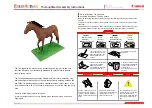
Assembly Instructions: Three A4 sheets
*Read the Assembly Instructions carefully in page order referring to the page numbers on the
parts list.
*It is easy to get pieces mixed up if you cut them all out at once, so just cut the pieces as you
need them.
*l indicates a part for the left side, and r is for the right. For example, Er01would be a part for
the right side, but E01 would mean that it can be used on either the right or the left side.
(dotted line)
Make a mountain fold.
(solid line)
Cut out.
(dotted and dash line)
Make a valley fold.
Cut a slot.
Scissors, set square, glue (such
as wood work glue), metal rod,
spatula, a used pen, toothpicks,
tweezers (useful for handling small
parts).
Before gluing, crease the paper
along mounrain fold and valley fold
lines andmake sure rouned
sections are nice anr stiff.
This craft requires the use of glue,
scissors, tweezers, and other tools
which may be dangerous to
young children. Please keep them
out of reach of children while you
work.
Thoroughbred: Assembly Instructions
1. Use a set square or ruler
and a dried up pen to score
along the dotted lines, and
fold along them to make
creases.
2. Work curves into the pieces
using a metal rod before
beginning assembly.
For small pieces, add curves
before cutting them out.
3. Use scissors to cut along
the solid line.
4. The pale-colored numbers
on the glue tabs indicate the
number of the part to be
attached there.
Use a spatula for the small
glue tabs.
Parts list (pattern): Ten A4 sheets
Mountain fold line
Cut line
Valley fold line
(solid line)
Slot line
Tools and Materials
Assembly tip
Caution
Instructions
PAGE01
The Thoroughbred is a breed of horse first developed during the 17th and 18th
centuries in England, by crossbreeding Arabians with native horses to produce
superior racing horses.
The Thoroughbred has been called the ultimate work of art ever produced by man,
and has a height of around 160 to 170cm (to the shoulders), weighing between 450
and 500kg. Its well-developed chest and hindquarters make it a fast runner. It can
run at speeds of up to 60 or 70km/h for minutes on end, even with a 50kg rider on its
back.
However, its thin legs are prone to injuries.
In terms of temperament, it is a very delicate horse, sensitive to loud noises and
bright lights.





















